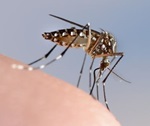Zika Virus

Zika virus is spread to people through the bite of infected mosquitoes. This disease is not spread in Connecticut; however, residents can acquire it by traveling to foreign endemic areas. Zika outbreaks have been reported in tropical Africa, Southeast Asia, the Pacific Islands, Central and South America, the Caribbean, and in Puerto Rico. In Connecticut, surveillance is conducted to identify travel-related cases. There is no vaccine to prevent or medicine to treat Zika virus infection. The best way to prevent getting sick from Zika virus is to prevent mosquito bites.
Where Has Zika Virus Been Found?
Zika Virus and Planning for Travel
Information for Clinicians
Letter from the Centers for Disease Control and Prevention
(Dengue and Zika Diagnostic Testing for Patients with a Clinically Compatible Illness and Risk for Infection with Both Viruses)
National Surveillance Case Definition
Connecticut Provider Reporting Information
Reportable Disease Confidential Case Report form, PD-23
Connecticut Laboratory Reporting Information
Reportable Laboratory Findings form, OL-15C
Directory of Clinical Testing Services provided by the State Public Health Laboratory
State Public Health Laboratory Contacts – for additional information
Connecticut Zika virus Surveillance
Zika virus was added to the state-wide reportable diseases list in February 2016. In Connecticut, surveillance is conducted to identify travel-related cases. Since 2016, an average of 40 cases (range 0 to 107) have been reported to the Connecticut Department of Public Health (DPH) annually. The majority of cases were reported during the 2016 outbreak.
Number of locally acquired Zika virus cases reported to the DPH from January 1 – December 31, 2019.
0 - Zero
Number of travel-related Zika virus cases reported to the DPH from January 1 – December 31, 2019.
0 - Zero
Connecticut Annual Infectious Diseases Statistics
Page last updated 1/14/2020.

